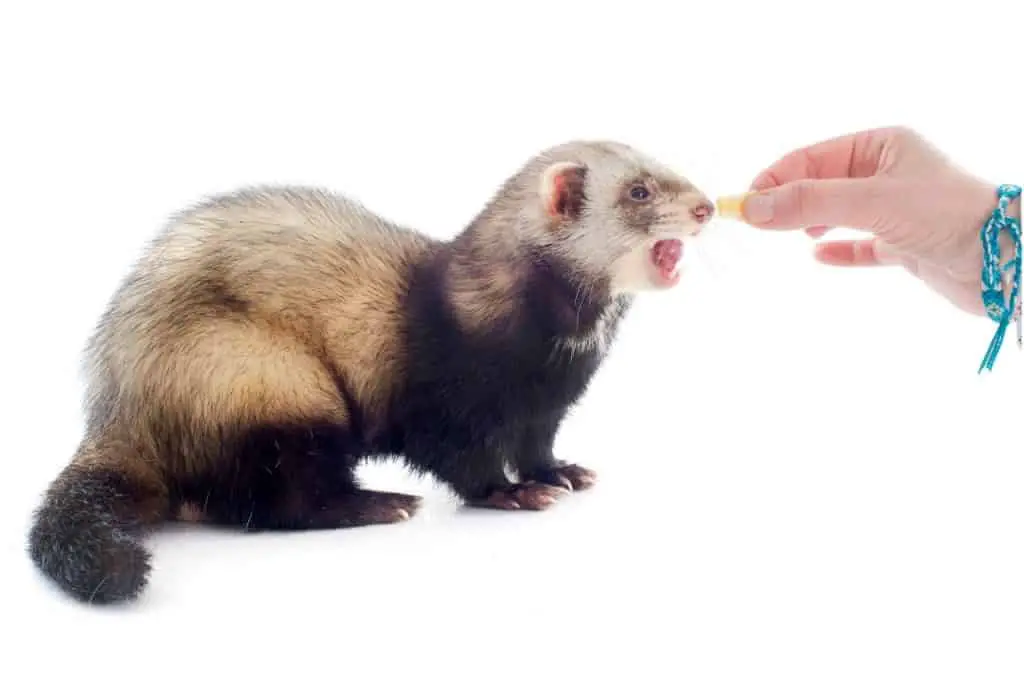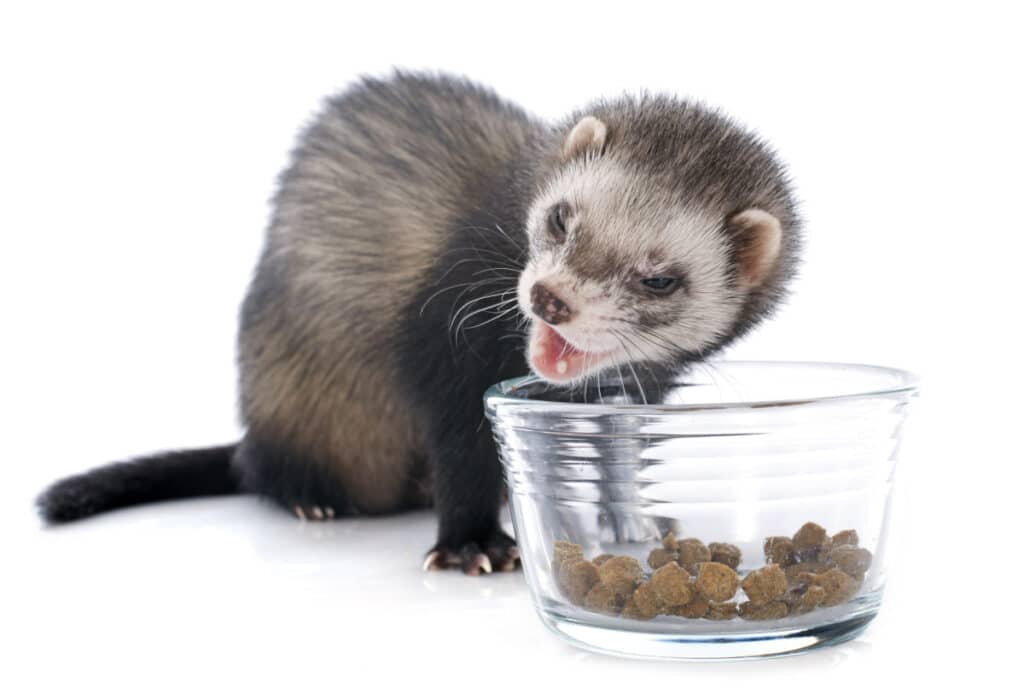Introduction
Can Ferrets Eat Fruit: Ferrets, the playful and curious members of the mustelid family, are beloved pets known for their unique personalities and inquisitive nature. As responsible ferret owners, it’s crucial to provide them with a balanced and nutritious diet to ensure their health and well-being. One question that often arises among ferret enthusiasts is whether these pint-sized carnivores can enjoy the occasional fruity treat. So, let’s embark on this journey to discover whether ferrets can partake in the colorful world of fruits and what precautions to take when offering them these delightful morsels. Ferrets, known for their carnivorous nature, have specific dietary requirements that primarily consist of high-quality animal-based protein and fat. However, the question of whether ferrets can eat fruit arises from the fact that they occasionally consume small amounts of plant matter in the wild, such as berries or fruits that might be present in the stomachs of their prey.
This prompts the consideration of whether incorporating fruits into their diet can be beneficial or potentially harmful to these lively pets. In this discussion, we’ll explore the nutritional needs of ferrets nocturnal, the potential advantages of adding fruit to their diet, the risks associated with it, and offer practical advice on how to safely incorporate fruits into their meals, if at all. As responsible ferret caregivers, understanding the intricacies of their dietary requirements is crucial, and this exploration aims to provide you with the knowledge necessary to make informed decisions about your ferret’s nutritional well-being. Ferrets are obligate carnivores, which means that their bodies are optimized for a diet primarily composed of animal-based foods.
Their digestive systems are short and lack some of the necessary enzymes to break down complex carbohydrates, like those found in fruits and vegetables. This carnivorous nature makes their protein and fat requirements essential for their health, energy, and overall vitality. However, some ferret owners may wonder whether offering small amounts of fruit could serve as a source of vitamins, fiber, or even a tasty treat. Fruits are rich in vitamins, minerals, and antioxidants that can benefit humans and some other animals, so it’s natural to consider their potential advantages for ferrets. Nonetheless, the introduction of fruit into a ferret’s diet requires careful consideration and moderation. Fruits are high in natural sugars, which can lead to health issues in ferrets, including obesity, dental problems, and gastrointestinal upset. Moreover, certain fruits may be toxic to ferrets due to specific compounds they contain.

What fruits and veggies can a ferret eat?
Ferrets are carnivores and in the wild are natural hunters eating every part of the animal they hunt. Your Ferrets diet should consist of meat, meat and more meat. It is not a good idea to feed them fruit or vegetables as well as grains as they cannot digest these foods well and potentially can become very sick.
Ferrets are obligate carnivores, which means that their natural diet primarily consists of meat. However, in the wild, they might consume small amounts of plant matter from the stomachs of their prey. While fruits and vegetables should not make up a significant portion of a ferret’s diet, some can be offered as occasional treats or for their potential nutritional benefits.
Remember that the primary focus of a ferret’s diet should be high-quality, meat-based commercial ferret food. Fruits and vegetables should complement their diet rather than replacing essential protein and fat sources. Always consult with a veterinarian who is knowledgeable about ferret nutrition for guidance on your specific pet’s dietary needs.
These fruits are rich in potassium and vitamins and can be offered as an occasional treat. However, due to their high sugar content, they should be given sparingly. Some ferrets enjoy raisins as a sweet treat. Like bananas, they should be given in small amounts due to their sugar content. These are relatively low in sugar and can provide antioxidants. They can be given as an occasional treat. Small pieces of cantaloupe can be offered in moderation, as it is lower in sugar compared to some other fruits.
What foods are poisonous to ferrets?
Vegetables – especially hard vegetables such as carrot, which can also block their digestive tract, and avocado. which is poisonous to ferrets. Fruit – These are very high in sugar. Grapes/raisins are also toxic to ferrets.
Ferrets are curious and playful animals that, like many pets, can be vulnerable to certain foods and substances that are toxic to them. It’s essential for ferret owners to be aware of these potentially harmful items to ensure the safety and well-being of their furry friends.
Chocolate contains theobromine and caffeine, which are toxic to ferrets (and many other animals). Ingesting even small amounts can lead to serious health issues, including seizures and heart problems.
These foods, along with chives, leeks, and shallots, contain compounds that can damage a ferret’s red blood cells and lead to anemia. Avoid any food that contains these ingredients.
Beverages like coffee and tea, as well as caffeine-containing products, can be toxic to ferrets. Ingesting caffeine can cause restlessness, rapid heart rate, and even death in severe cases.
Can ferrets eat potatoes?
Ferrets can’t digest lactose (a sugar found in dairy products such as milk and cheese) They can’t digest certain carbohydrates (found in starchy foods such as potato and bread) that well, so it’s best to avoid food with these ingredients.
Ferrets are obligate carnivores, which means that their natural diet primarily consists of animal-based proteins and fats. While they are not designed to digest plant matter efficiently, the question of whether ferrets can eat potatoes sometimes arises among ferret owners due to the prevalence of potatoes in human diets.
Raw potatoes are not recommended for ferrets. They contain starches and complex carbohydrates that can be challenging for ferrets to digest. Additionally, raw potatoes may contain solanine, a toxic compound that can be harmful to both humans and animals when consumed in large quantities. Feeding raw potatoes to ferrets can lead to digestive upset and potential health issues, so it’s best to avoid them entirely.
While cooked potatoes are easier for ferrets to digest compared to raw ones, they still don’t provide much nutritional value for these obligate carnivores. Potatoes are high in carbohydrates and low in essential nutrients that ferrets require for optimal health, such as protein and fat. Feeding cooked potatoes as a significant part of a ferret’s diet can lead to obesity and other health problems.
Can ferrets eat chicken?
Ferrets love both cooked and raw meat, in particular rabbit, poultry and mice. Raw meat should be given fresh and don’t worry about the bones, ferrets can eat bones and they are a great source of calcium, marrowbone and minerals.
Always offer cooked chicken to your ferret. Raw chicken may contain harmful bacteria that can make your ferret sick. You can cook chicken by boiling, baking, or grilling it, but avoid using any seasonings, spices, or sauces that may be harmful to ferrets.
Remove the bones and skin from the chicken before feeding it to your ferret. Bones can be a choking hazard and may cause digestive problems, while the skin can be high in fat and may not be well-tolerated by some ferrets.
While chicken is a suitable source of protein, it’s essential to offer a variety of protein sources in your ferret’s diet. You can also include other meats like turkey, beef, and lamb to ensure a well-rounded nutritional profile.
Like any treat or addition to your ferret’s diet, chicken should be given in moderation. A small, bite-sized piece of cooked chicken as an occasional treat or part of a balanced diet is sufficient.
How do you potty train a ferret?
During the training period, continue to place any feces or soiled bedding from elsewhere in the cage, into the box. Ferrets are intelligent and respond well to positive reinforcement (praise). Each time they go to the toilet in their litter tray, give them a tasty treat and plenty of praise.
Potty training a ferret, like training any pet, requires patience, consistency, and understanding of your furry friend’s natural instincts. Ferrets are generally quick learners, and with the right approach, you can successfully teach them to use a designated area for their bathroom needs.
Select a litter box that is appropriate for your ferret’s size. You can find litter boxes specifically designed for ferrets at pet stores, or you can use a shallow, low-sided plastic box. Ensure the litter box has high sides to prevent litter from being kicked out.
Position the litter box in a convenient, accessible location within your ferret’s enclosure or play area. Ferrets tend to have predictable bathroom habits, so pay attention to where they naturally choose to go.
Watch your ferret closely, especially during playtime or when they wake up, as these are times when they are more likely to need to use the litter box.
Ferrets typically relieve themselves shortly after waking, after eating, and during play.
Can ferrets have turmeric?
Turmeric is beneficial for arthritic conditions in small pets due to the anti-inflammatory properties and is COX2 inhibitors. You can use turmeric for your small pet as anti-cancer support due to its antioxidant properties.
Ferrets’ Dietary Needs: Ferrets have a relatively simple and specialized digestive system that is optimized for processing animal-based proteins and fats. Their diets should prioritize these essential nutrients for their health and well-being.
Turmeric and Curcumin: Turmeric contains a compound called curcumin, which is believed to have anti-inflammatory and antioxidant properties. These properties can be beneficial for some animals and humans. However, ferrets do not typically suffer from the same inflammatory conditions that might lead to turmeric supplementation in other species.
Lack of Research: There is limited scientific research on the effects of turmeric and curcumin specifically on ferrets. As such, it’s challenging to determine whether turmeric provides any meaningful benefits to them.
Potential Risks: While small amounts of turmeric are unlikely to be toxic to ferrets, giving them excessive amounts could lead to digestive upset or other adverse reactions. Always introduce new foods or supplements slowly and in moderation.
Can ferrets eat cucumber?
The rule of thumb is no more than a total of one heaping teaspoon per day/ferret of any treat should be given. Some favorite fruit and vegetable treats are cucumber, green pepper, and melon. Never Feed Your Pet Foods That Are High In Refined Sugars!
Ferrets are obligate carnivores, which means that their natural diet primarily consists of animal-based proteins and fats. While fruits and vegetables are not a significant part of their dietary requirements, some ferret owners wonder whether they can safely offer certain vegetables like cucumber to their pets.
Keep in mind that cucumber should not replace the primary focus of your ferret’s diet, which should consist of high-quality commercial ferret food that meets their specific nutritional needs. Protein and fat from animal sources are crucial for their health and vitality.
If you have concerns about your ferret’s diet or are considering introducing new foods, it’s essential to consult with a veterinarian who specializes in ferret care. They can provide guidance on the appropriate treats and dietary adjustments for your specific pet.
Can ferrets eat chocolate?
Chocolate is high on the list of foods a ferret shouldn’t eat. As little as 2 oz. of milk chocolate or just 1/10th of an oz. of baking chocolate is enough to kill a two pound ferret, according to Dr.
The severity of symptoms can vary depending on the amount and type of chocolate ingested and the individual ferret’s sensitivity. Dark chocolate and cocoa powder contain higher levels of theobromine and caffeine than milk chocolate, making them even more dangerous.
If you suspect that your ferret has ingested chocolate or is showing any of the symptoms mentioned above, it’s essential to seek immediate veterinary attention. The veterinarian will provide appropriate treatment, which may include inducing vomiting, administering activated charcoal to absorb toxins, and providing supportive care to manage symptoms.
To keep your ferret safe and healthy, it’s crucial to keep chocolate and any chocolate-containing products out of their reach. Educate family members and housemates about the dangers of chocolate to ensure that your curious and inquisitive ferret does not accidentally ingest this toxic substance.

Conclusion
In the quest to determine whether ferrets fruits, it becomes evident that while these small carnivores have unique dietary requirements that primarily revolve around animal-based proteins and fats, the inclusion of fruit should be approached with caution and moderation. Ferrets are obligate carnivores, and their digestive systems are not well-equipped to process carbohydrates and sugars found in fruits. While some fruits do contain valuable nutrients like vitamins and antioxidants, the risks associated with feeding fruit to ferrets, such as potential weight gain, dental issues, and digestive problems, cannot be ignored. Additionally, certain fruits may even be toxic to these inquisitive pets.
As responsible ferret owners, it’s essential to prioritize the nutritional needs of your furry companions. Any attempt to introduce fruit into their diet should be done sparingly, in small portions, and carefully monitored for adverse effects. Consulting with a veterinarian who specializes in exotic pets can provide valuable guidance on the suitability of specific fruits and the overall impact on your ferret’s well-being. In summary, while it is possible for ferrets to enjoy the occasional fruit treat, it should always be done with an abundance of caution and a firm understanding of their unique dietary requirements. Ensuring that your ferret receives a balanced and nutritious diet tailored to their carnivorous nature remains the top priority in promoting their health and longevity.
The key takeaway is that any introduction of fruit into a ferret’s diet should be approached thoughtfully and cautiously. Always prioritize their primary dietary requirements of animal-based proteins and fats. If you choose to offer fruit, do so in minimal quantities, as an occasional treat rather than a significant part of their daily intake. Monitor your ferret for any adverse reactions and consult with a veterinarian for expert advice on suitable fruits and portion sizes. Ultimately, by prioritizing your ferret’s nutritional needs and being informed about the potential benefits and risks of including fruit in their diet, you can provide them with the best possible care, ensuring a happy and healthy life for your beloved furry friend.





No Comments